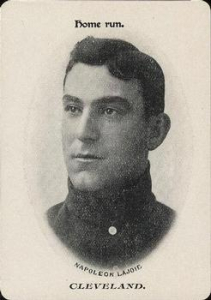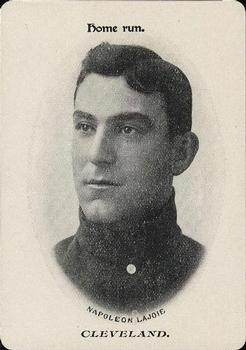July 30, 1901: Nap Lajoie, ‘champion batsman of the world,’ hits for the cycle with grand slam
 In late July 1901, the Philadelphia Athletics traveled to Cleveland to complete an 11-game Western swing with a two-game series against the Blues. When the series opened on Saturday, July 27, the home team won, 4-3, but Philadelphia’s Napoleon “Nap” Lajoie was 3-for-5, boosting his batting average to a league-leading .429 in the American League’s inaugural season; this was his fourth straight game with three hits.
In late July 1901, the Philadelphia Athletics traveled to Cleveland to complete an 11-game Western swing with a two-game series against the Blues. When the series opened on Saturday, July 27, the home team won, 4-3, but Philadelphia’s Napoleon “Nap” Lajoie was 3-for-5, boosting his batting average to a league-leading .429 in the American League’s inaugural season; this was his fourth straight game with three hits.
Cleveland did not play home games on Sundays, and a scheduled game for Monday, July 29, was rained out, giving the clubs a two-day delay between the first and last games of the series.
Lajoie, described in the papers as the “champion batsman of the world,”1 was the star of the second game as well. He had opened the 1901 season with 10 hits in his first 11 at-bats (plus a base on balls), good for a .909 batting average. He continued the torrid hitting, garnering at least one hit in each of his first 16 games, after which he was batting .578.
Through July 27, Lajoie had been held hitless in only nine games out of 74 games played. Unfortunately, the Athletics had eight other mortals who took the field each day with Lajoie, and after those 74 games, Connie Mack’s club was in sixth place in the AL, 4½ games above the Blues.
Not only was Lajoie hot, but the weather through most of Ohio during the third and fourth weeks of July was unbearably warm, with temperatures climbing into the mid- to high 90s. Every day, newspapers reported weather-related deaths. On the morning of the series finale, westerly breezes were forecast, a sign that things might be cooling off at last.2
Perhaps due to the heat, only 1,400 spectators turned out to League Park for the series finale on Tuesday afternoon. Those who did attend witnessed firsthand Lajoie’s sizzling-hot bat, as he hit for the cycle against the Blues.
The pitching matchup was two rookies, whose performances to this point in the season were pretty similar. Taking the mound one day after his 24th birthday, Cleveland right-hander Earl Moore entered his 19th start and 20th appearance with a 9-9 record and a 3.19 earned-run average. Opposing him was Philadelphia’s 25-year-old future Hall of Fame left-hander Eddie Plank, who sported a 10-7 record and a 3.11 ERA. This was also his 19th start in 20 appearances. Both hurlers matched each other in effectiveness until the seventh inning, when Lajoie and the Athletics steamrolled to an insurmountable lead.
In the top of the second, Lajoie, batting fourth for Philadelphia, “whacked the first ball pitched”3 to the fence in left field. The ball rebounded toward the infield, allowing Lajoie to leg out a triple. One out later, however, Lajoie “was squelched at home”4 when he tried to score on Matty McIntyre’s grounder to shortstop, and Moore escaped the inning without yielding a run.
In the bottom of the third inning, Cleveland’s Frank Scheibeck started things with a single. After Moore struck out, Ollie Pickering singled. Jack McCarthy hit a grounder to third, forcing Scheibeck for the second out. Pickering and McCarthy worked a double steal, and both runners scored on a single by Jack O’Brien, who tried to stretch his hit into a double but was tagged out at second. Still, Cleveland had a 2-0 lead.
According to the papers, for the first three innings, “the Clevelands played with their usual snap and vim,”5 but in the fourth, their play “would not have done credit to even an amateur team.”6 Lajoie hit a grounder to second, but Erve Beck made a wide throw; Lajoie took third on the three-base error. This was the first of four errors for the Blues. Lajoie scored on Socks Seybold’s double.
Cleveland answered in its half, manufacturing a run on a walk to Beck, a sacrifice by George “Candy” LaChance, and a single by Bill Bradley. In the top of the fifth, Philadelphia’s Joe Dolan singled and promptly stole second. He advanced to third base when Moore “tried to throw the ball over the grandstand”7 and scored on Dave Fultz’s one-out single, cutting the deficit to 3-2.
Another Philly run tied the score in the sixth inning. Lajoie drove the ball down the third-base line for a leadoff double. Two outs later, Doc Powers singled Lajoie home.
Moore had pitched six innings, keeping his team in the game, but the seventh proved to be his undoing. Dolan began the onslaught with a single through shortstop. Plank bunted toward first baseman LaChance, but pitcher Moore was slow getting to the bag and dropped LaChance’s throw. Both runners were safe.
Fultz also bunted, this time toward the third-base side of the mound. Cleveland third baseman Bradley moved to cover the base, but Moore did not jump off the mound until it was too late. Philadelphia had loaded the bases.
Harry Davis followed with a slow roller to second, which Beck fumbled, allowing the go-ahead run to score. Lave Cross hit a hard liner into the hole at short, and Scheibeck made a great stop, but Cross beat the throw to first. This resulted in another run, and the sacks were still full.
This meant “the mighty Lajoie came up to bat.”8 The Cleveland Plain Dealer reported that as Lajoie approached the batter’s box, his teammate Powers yelled, “Don’t forget to touch all the bases, Larry!”9 With a full count, Lajoie lifted the ball over the left-field fence and indeed touched all the bases for a home run, his sixth of the season.
Philadelphia’s bats didn’t stop. Seybold stroked a triple to deep right-center. McIntyre reached on an error by LaChance, with Seybold remaining at third. Powers drew a walk, loading the bases once more.
Cleveland manager Jimmy McAleer made a change, bringing in veteran Bill Hart to relieve Moore. Hart had been in and out of the majors since 1886, and had signed with the Blues in 1901. This was his 20th appearance for Cleveland, although it was his first of the season in relief.10 According to the Cleveland Leader, “this had the desired effect,”11 as Dolan hit into a double play while Seybold scored, and Plank struck out to end the inning. The Athletics had sent 11 men to the plate and scored seven runs, taking a 10-3 lead.
The Blues rallied in the bottom half but could tally only twice, on a double by LaChance and singles by Bradley and Joe Connor. The three hits had come on Plank’s first three pitches. The Blues had trimmed the Philadelphia advantage to five runs.
After Bradley scored, Plank supposedly pleaded with his manager to be relieved. Mack called for two pitchers to warm up and told Plank to finish the inning. Plank “recovered his nerve”12 and stayed in the game, and he did not allow another Cleveland batter to reach first base for the rest of the game.
In the eighth, Lajoie had to be “content with a screaming single.”13 In completing the cycle, Lajoie drove in teammate Davis, who had started the inning with a double.
The A’s won, 11-5. They captured 10 of their next 12 games but could not climb out of fifth place.14 The Blues won eight of their next nine games but then faded in September.
Even though Philadelphia was the visiting team, Lajoie was “cheered repeatedly every time he came up to bat.”15 He reached base in all five at-bats, scored three times, drove in six runs, and became the third player to hit for the cycle in 1901.16 He raised his batting average to .435.
In 1901, Lajoie was the first American Leaguer to win baseball’s Triple Crown (third overall in major-league history17). According to his SABR biography, “Nap punished the American League’s overmatched pitchers in 1901, becoming just the third triple crown winner in baseball history with a .426 batting average (the highest posted by any player in the twentieth century), 14 home runs, and 125 RBI. Lajoie also led the league in hits (232), doubles (48), runs scored (145), on-base percentage (.463), and slugging percentage (.643).”18 He single-handedly out-homered the entire Blues team, which had 12 total home runs. Even more remarkably, Lajoie struck out only nine times for the entire season.19 In early August, The Sporting News ran an article about his success at the plate, stating, “Napoleon Lajoie not only retains his lead as premier batsman of the American League, but has actually hoisted his percentage during last week and bids fair to stick in the .400 ranks in lonely glory.”20 His batting average never dipped below .411 all season.21
As it happened, Lajoie’s July 1901 cycle was a preview of many more big days to come in Cleveland. A court ruling in April 1902 prevented Lajoie from playing in American League games in Pennsylvania, and Mack allowed him to sign with Cleveland to keep him in the AL. In 13 seasons with Cleveland — soon known as the Naps in his honor — Lajoie batted .339, leading the AL in hitting four more times.
Acknowledgments
The author sincerely thanks Mark Tidrick, subject department librarian at the Cleveland Public Library, for assisting with articles from the Cleveland Leader and the Cleveland Plain Dealer, both of which provided some of the game’s play-by-play.
This article was fact-checked by Kevin Larkin and copy-edited by Len Levin.
Sources
In addition to the sources mentioned in the Notes, the author consulted Baseball-Reference.com, MLB.com, Retrosheet.org, and SABR.org. Play-by-play is not available from either Retrosheet or Baseball-Reference, but box scores can be found at:
https://www.baseball-reference.com/boxes/CLE/CLE190107300.shtml
https://www.retrosheet.org/boxesetc/1901/B07300CLE1901.htm
Notes
1 “American League,” Cleveland Plain Dealer, July 31, 1901: 6.
2 “The Weather,” Cincinnati Post, July 30, 1901: 1.
3 “American League.”
4 “American League.”
5 “Sporting News,” Cleveland Leader, July 30, 1901: 7.
6 “Sporting News.”
7 “American League.”
8 “Sporting News.”
9 “American League.”
10 This turned out to be Hart’s final appearance in the majors. The next day he was released by the Blues. The righty continued to play in the minors until 1910.
11 “Sporting News.”
12 “American League.”
13 “American League.”
14 Philadelphia won 40 of its final 60 games (in August and September) but still finished the season in fourth place in the American League. Cleveland went 24-33, finishing in seventh place.
15 “Sporting News.”
16 Three major leaguers hit for the cycle in 1901: Lajoie’s teammate Harry Davis (July 10, against the Boston Americans), Fred Clarke (July 23, against the Cincinnati Reds), and Lajoie. The five previous Athletics players to hit for the cycle were Lon Knight (July 30, 1883), Henry Larkin (June 16, 1885), Chippy McGarr (September 23, 1886), Harry Stovey (May 15, 1888), and Harry Davis.
17 Lajoie followed Paul Hines (1878, Providence Grays) and Tip O’Neill (1887, St. Louis Browns) as the third player to capture baseball’s batting Triple Crown.
18 Stephen Constantelos and David Jones, “Nap Lajoie,” SABR Biography Project, found online at https://sabr.org/bioproj/person/Nap-Lajoie/. Accessed January 2023.
19 This is according to Retrosheet’s daily statistics for Lajoie. Unfortunately, it is incomplete.
20 “Lajoie Leads the American,” The Sporting News, August 10, 1901: 7.
21 See https://www.retrosheet.org/boxesetc/1901/Ilajon1010061901.htm. Accessed January 2023.
Additional Stats
Philadelphia Athletics 11
Cleveland Blues 5
League Park
Cleveland, OH
Box Score + PBP:
Corrections? Additions?
If you can help us improve this game story, contact us.


